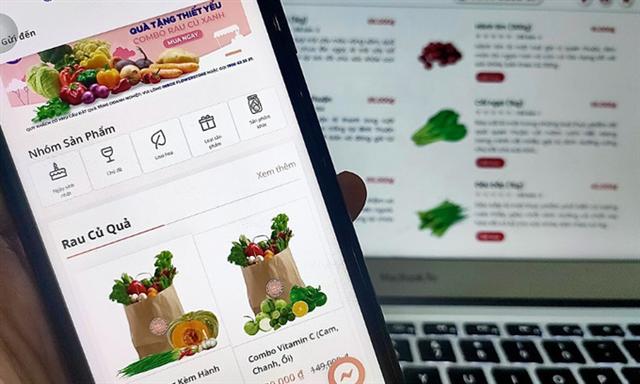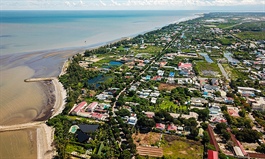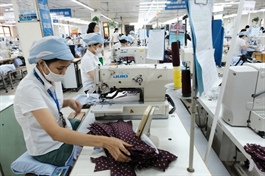‘Non-essential’ businesses seek ways to survive pandemic
‘Non-essential’ businesses seek ways to survive pandemic
“Non-essential” businesses are adopting various ways to survive the fourth Covid-19 wave, diversifying or shifting to a new product range, or boosting online sales and marketing.
Vegetables seen on the website of FlowerStore amid the Covid-19 pandemic. Photo by VnExpress/Vien Thong.
|
Many flower shops in HCMC these days have switched to selling agriculture produce. Some pack the produce in attractive wrapping and sell them as corporate gifts.
The FlowerStore, which delivers flowers in Hanoi and HCMC, is promoting its vegetable combos including orange, carrot, guava and various types of vegetables at prices ranging from VND140,000-500,000 ($6.10-21.79).
THEBEST Boutique, which sells cosmetics and perfumes in HCMC, now offers rapid Covid-19 test kits and supplements.
The fact that Covid-19 patients with mild symptoms are allowed to treat themselves at home is an opportunity for the store to earn some revenue, said a company spokeswoman.
Vua Cua, a crab restaurant chain in HCMC, is now selling all its products online alongside other types of food like corn, dumplings, sauces and bread.
The company’s CEO Doan Thi Anh Thu said they have sold over 50,000 breads since July.
The company, which sources products from the southern province of Dong Thap, has seen a surge in online demand and has been unable to fulfill some orders due to staff shortage and lack of delivery platforms.
"We are recruiting 20 more shippers to meet rising demand," Anh Thu said.
Several other businesses, however, have stick to their original products and are trying to improve their services to prepare for a quick recovery after the pandemic crisis becomes less intense.
Decoration and lifestyle brand Seeker is still ship products to localities where delivery is allowed.
Ha Uyen, owner of the company, said: "We are investing more in customer interaction and research trends and products to be ready for a comeback."
Children fashion brand Yodi Kids has chosen to upgrade their products.
"Children fashion has higher requirements for environmentally friendly materials and therefore researching and creating new products is vital," said spokesperson Nguyen Viet Hoa.
The company is also taking this opportunity to upgrade its stores and/or secure new locations.
Other businesses have temporarily stopped operations, but remain active in interacting with customers and potential customers to retain brand recognition and awareness.
"We have stopped selling plants and switched to showing customers how to take care of their plants using recycled materials via social media," said Lam Ha, owner of decoration plants shop Cay Nho.
Bakery chain The Vagabond, which has stopped delivering, is now using social media to inspire people to bake and cook at home during social distancing.
"Maintaining these activities is important to remind customers of our brand," said co-founder Nguyen Hoang Viet.
Vietnam has recorded nearly 129,600 Covid-19 cases in the latest wave. HCMC and Hanoi continue to impose strict social distancing measures and have ordered all non-essential businesses to close to curb the spread of the disease.






















